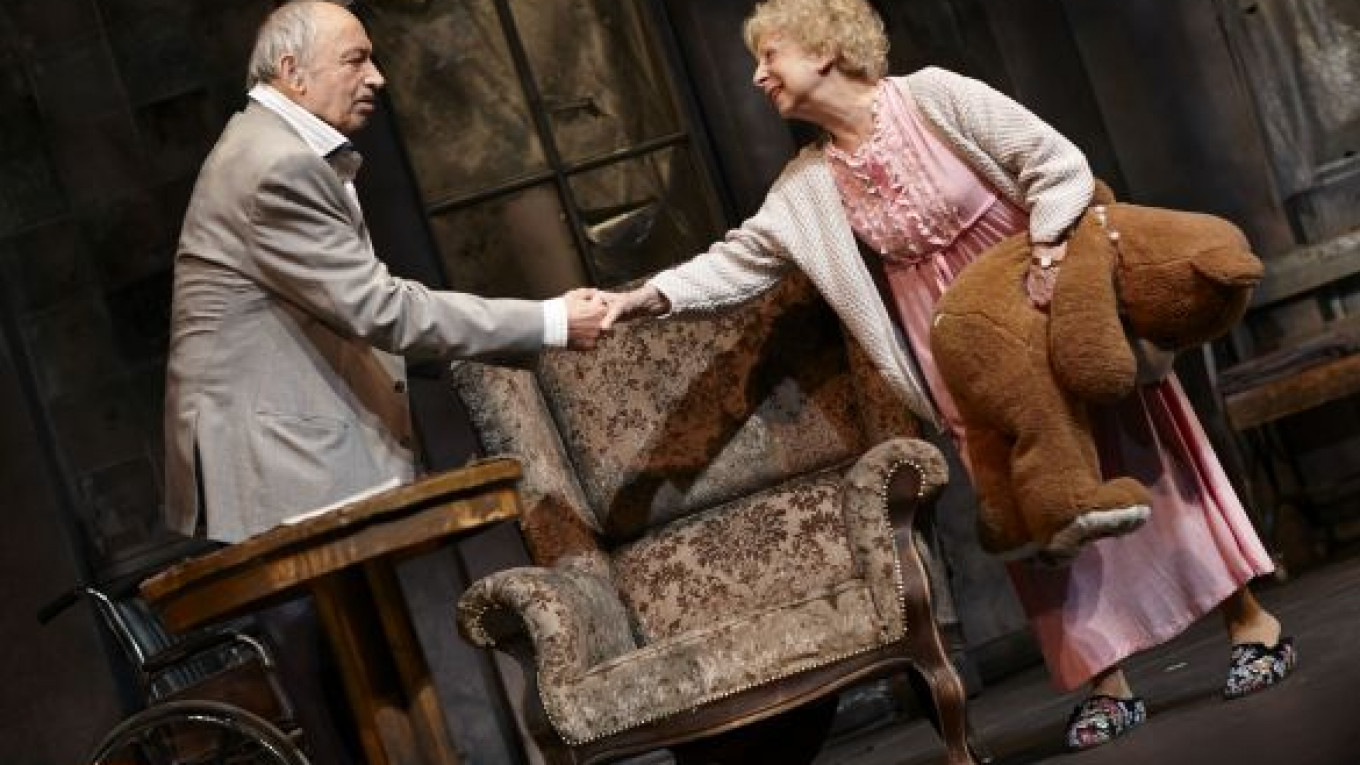Donald L. Coburn's "The Gin Game" became an instant classic in the 1970s because of its extreme simplicity and, I would wager, its honesty.
It tells the story of two lonely nursing home residents overcoming their initial distrust of one another in order to build a relationship … that ends in disillusionment and distrust. It's funny and it's sad and it lets its performers wear their hearts on their sleeves.
Having recently celebrated her 80th birthday, Sovremennik Theater artistic director Galina Volchek chose to stage the play with two of her theater's most popular actors — Liya Akhedzhakova and Valentin Gaft. That part of it, at least, is a beautiful match, the towering Gaft's gruff, manly manner clanging wonderfully up against the petite Akhedzhakova's flighty flirtatiousness.
Gaft's Weller Martin is cantankerous and dismissive and maybe even rude, at least he would be if he weren't so charismatic. Stuck in a cheap nursing home because, he claims, he had bad business partners, he is bitter and jaded. But none of that hides entirely the pussy cat lurking inside the lion that he instinctively projects.
Akhedzhakova, as Fonsia Dorsey, flits around him like a tweety bird, leaping up onto her chair out of sheer excitement, hiding in corners when frightened, and always, it seems, talking, talking and talking.
There is no big story here, and that is no criticism. "The Gin Game" is a fine excuse for two great actors to let loose their inhibitions and have at it. Oh, yes, we learn that Fonsia's son has abandoned her and that her marriage ended badly and early. And Weller is no better off, having fallen from the heights of success to the embarrassment of living on welfare.
But these aren't the details that matter. What drives, controls and reveals each of these two individuals is personal character. And that comes out clearly once the two begin playing cards each day.
Jealousy, frustration, anger and vindictiveness — these are the kinds of traits that break out into the open so quickly when given the opportunity. The artifice of a simple card game unleashes the real demons lurking inside each of these individuals.
Weller, a past master at gin, simply cannot defeat the novice Fonsia. And if he can be grudgingly magnanimous about losing once or twice, he does not have it in him to bear the long string of inexplicable successes that Fonsia lords over him. Hardest to take of all is when he finally does win — he is certain, of course, that Fonsia threw the game out of pity and it drives him mad with fury.
The worse Weller's behavior grows, the more Fonsia sees in him the typical male who, like her ex-husband and her ungrateful son, only wishes to use and abuse her.
Alone, entirely unknown to each other, and starting their relationship from scratch, Fonsia and Weller have the chance to strike out anew and find new strength and meaning in their lives. But that potential fails early and hard, giving way to old bad habits that have haunted both forever.
Watching Gaft and Akhedzhakova duel and maneuver for two hours is a joy. The two brilliant, magnetic actors clearly have a blast going at each other.
Less effective is what exists around them.
Pavel Kaplevich's dirty, grungy, labyrinthine set runs counter to the play's innate simplicity. A dark, winding corridor in the back, broken-down furniture, and shadows climbing the soiled walls all work too hard to inform us that the characters are down and out, while constantly distracting us from the only reason this play really exists — the duel of characters that overwhelms Weller and Fonsia.
Alexander Bakshi provides a soundscape that occasionally suggests noisy, happy family reunions taking place unseen behind closed doors, and interjects the sounds of weather into the human drama taking place on stage.
In order to avoid providing a full-fledged spoiler I will limit myself to saying that the grandiose, apocalyptic ending struck me as being completely out of character for this tight, focused character portrait.
And yet, I walked away from this performance with a smile on my face and a spring in my step. Whatever else may happen, Gaft and Akhedzhakova carry the day.
"The Gin Game" (Igra v Dzhin) plays Jan. 30, Feb. 3, 13 and 17 at 7 p.m. at the Sovremennik Theater, 19 Chistoprudny Bulvar. Metro Chistiye Prudy. Tel. 495-621-6473. sovremennik.ru. Running time: 2 hours, 10 minutes.
Contact the author at [email protected]
A Message from The Moscow Times:
Dear readers,
We are facing unprecedented challenges. Russia's Prosecutor General's Office has designated The Moscow Times as an "undesirable" organization, criminalizing our work and putting our staff at risk of prosecution. This follows our earlier unjust labeling as a "foreign agent."
These actions are direct attempts to silence independent journalism in Russia. The authorities claim our work "discredits the decisions of the Russian leadership." We see things differently: we strive to provide accurate, unbiased reporting on Russia.
We, the journalists of The Moscow Times, refuse to be silenced. But to continue our work, we need your help.
Your support, no matter how small, makes a world of difference. If you can, please support us monthly starting from just $2. It's quick to set up, and every contribution makes a significant impact.
By supporting The Moscow Times, you're defending open, independent journalism in the face of repression. Thank you for standing with us.
Remind me later.







